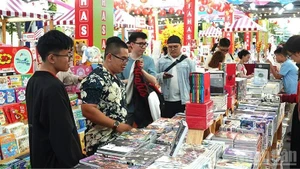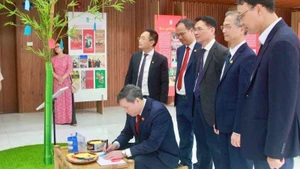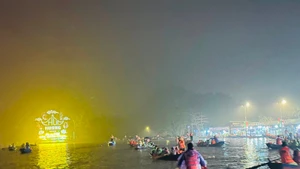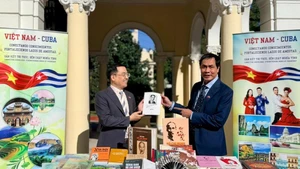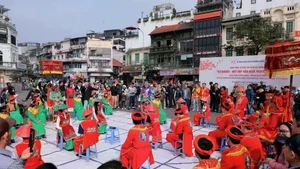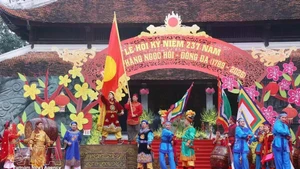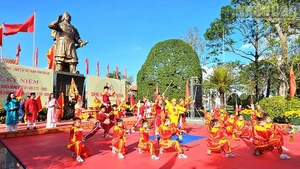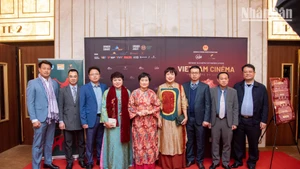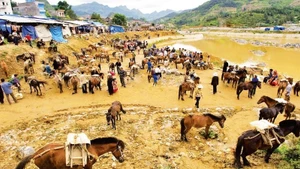General Secretary To Lam signed and issued four important resolutions: Resolution No.57-NQ/TW on breakthroughs in science and technology development, innovation and national digital transformation; Resolution No.59-NQ/TW on international integration in the new situation; Resolution No.66-NQ/TW on innovation in law-making and enforcement to meet the requirements of national development in the new era; and Resolution No.68-NQ/TW on private economic development. These are considered the fundamental institutional pillars, creating a strong driving force to move our country forward in the new era. In the cultural field, the “quartet of resolutions” truly creates a new impetus, contributing to the breakthrough development of Vietnamese culture.
In the 4.0 era, technology helps preserve, spread, and exploit cultural values more effectively, but it also poses the risk of falling behind, increasing copyright infringement, and so on, if technology and digital transformation are not applied effectively. Resolution No.57-NQ/TW on breakthroughs in science, technology, innovation, and national digital transformation (Resolution No.57) has opened great opportunities for comprehensive cultural development.
A new look for cultural activities
The Party identifies culture as the spiritual foundation of society, both the goal and the driving force for socio-economic development. In the 4.0 era, the application of technology in cultural development is increasingly receiving attention. The Viet Nam Cultural Development Strategy to 2030, as approved by the prime minister in November 2021, requires cultural development to “adapt to the development trends of the Fourth Industrial Revolution, new and modern technologies and socio-economic changes.”
However, it was not until the Politburo issued Resolution No.57 that the awareness and actions of entities operating in the cultural field really had turning points due to the breakthrough in viewpoints and solutions. Resolution No.57 considers people and businesses as the centre and subjects; scientists as the key factor, and the state plays the role of creating and paving the way for science, technology, and digital transformation to develop.
Regarding solutions, for the first time, the resolution accepts risks and accepts risky investments. Resolution No.57 comprehensively addresses the awareness of cadres, party members and people, infrastructure investment, and promoting public-private cooperation, focusing on human resource development, especially high-quality human resources, to create leverage, thereby contributing to the formation of a comprehensive “technology ecosystem” to promote cultural development.
Responding to the practical needs of life, immediately after its promulgation, Resolution No.57 has created a new impetus in cultural development. Since early 2025, cultural activities have shown clear changes in the application of technology to preserve and promote traditional values and enhance heritage. Many traditional festivals have become closer and more attractive to people such as: Dong Da Mound Festival (Ha Noi) and Tran Temple Festival (Hung Yen province).
Digital transformation is also widely deployed in building a cultural lifestyle, such as the movement for the whole people to unite to build a cultural life through social networks, bringing messages of building a cultural life to the community in the fastest and most convenient way. Technology also creates favourable conditions for cultural exports, including both specific products and intangible cultural values, thereby helping to raise the status of Vietnamese culture in the international community.
Notably, the MV Bac Bling by singer Hoa Minzy released on cyberspace has become a global phenomenon. On the occasion of the 80th anniversary of National Day September 2, cultural, artistic, exhibition activities, etc. took place vibrantly across the country. Many events attracted large audiences, from tens of thousands to millions of people interested and following, such as political art programs and the National Achievement Exhibition. The explosion of technology, especially digital applications, marked the success of these programs.
Untangling bottlenecks, creating leverage for cultural development
Deputy Minister of Culture, Sports and Tourism Phan Tam commented: In the context of digital transformation that has been taking place like a storm, the cultural sector cannot stand aside. However, unlike digital transformation in economic-technical fields, digital transformation in culture has unique characteristics, because culture is closely linked to intangible factors, historical depth, national identity, and community memory.
Agreeing with this view, Professor, Dr. Tu Thi Loan, former Acting Director of the National Institute of Culture and Arts, said that digital transformation of the cultural sector is not only about digitising documents and artifacts, but also about transforming thinking, operating methods, approaches, and organisational-management models thanks to the application of digital technology, big data, artificial intelligence, internet of things, cloud computing, etc.
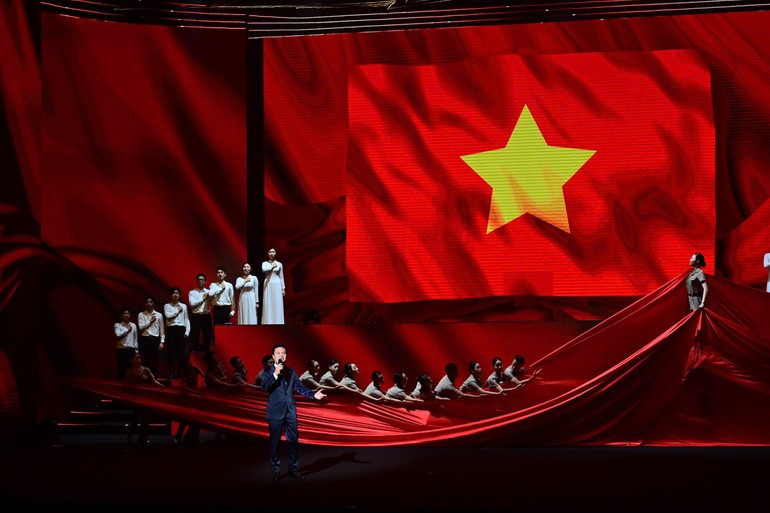
The goal of cultural digital transformation is not only to achieve economic efficiency or automation, but also to focus on preserving and promoting the value of identity, historical depth, culture, and tradition, through creative forms of expression. Therefore, digital transformation in culture is to transform the mindset of preserving, receiving, organising, and developing new forms of communication and expression while still ensuring identity and traditional values when moving to the digital environment.
At the same time, digital transformation in the cultural field includes the use of data and digital technology to transform the operating model of agencies and organisations in the cultural sector in a modern and creative direction to achieve breakthrough results and create new values.
From the guiding perspective of Resolution No.57, science, technology, and digital transformation are the main driving forces to rapidly develop modern productive forces, perfect production relations, innovate national governance methods, develop the socio-economy, and make the country develop rapidly and become rich in the new era, and the cultural industry is one of the most affected subjects. Proactively adapting will provide great opportunities and is the key to promoting the development of the cultural industry.
There, along with the state’s leadership and management role, it is necessary to mobilise the participation of all resources in society. From the practical activities of her unit, Ms. Nguyen Lien Huong, Deputy Director of the Centre for Cultural and Scientific Activities of the Temple of Literature, shared her experience: “It is necessary to mobilise the participation of businesses, social organisations, communities, individuals, and domestic and foreign experts — in terms of finance, technology, knowledge and experience.
To encourage the participation of young people in particular, it is necessary to create an environment that attracts young people — those who understand and love heritage, are proficient in technology, and have the ability to be creative — to contribute to the work of preserving and promoting the value of relics in new and more creative ways”. Thus, implementing Resolution No.57 requires building high-quality human resources with in-depth expertise in creative technology, digital cultural management, digital economy, and digital content management.
Furthermore, Resolution No.57 needs to continue to specify the contents on encouraging subjects to invest in science, technology, and digital transformation as well as encourage startups in science, technology, digital transformation, etc. through transparent and effective support policies.
The application of science, technology, and digital transformation in culture requires synchronous participation with a comprehensive transformation in the awareness and actions of organisations and individuals. In the government’s Resolution No.71/NQ-CP (dated April 1, 2025) on amending, supplementing, and updating the government’s action program to implement Resolution No.57 of the Politburo, the government assigned the Ministry of Culture, Sports and Tourism to develop and implement the project on digital transformation in the cultural field to submit to the prime minister for approval in December 2025.
Public opinion expects the project to concretise Resolution No.57 into specific policies, gradually creating a modern and humane Vietnamese digital culture, linking tradition with the future while creating leverage for cultural development.

